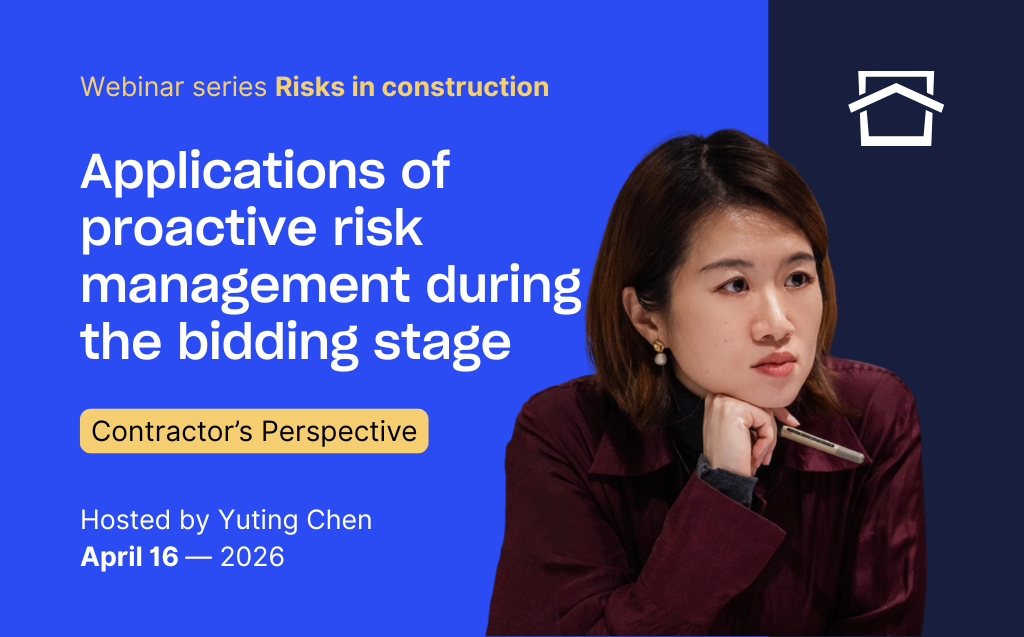Amendments to FIDIC 1999 Suite of Contract in practice
How is FIDIC 1999 Suite of Contract used and amended in practice based on 454 collected contract documents, and how the amendments bring risk in the project in the later stages.
This is the second webinar in a series of knowledge sharing related to contract, FIDIC, and risk analysis in the construction industry.
The analysis of amendments made to FIDIC 1999 Suite of Contract will be introduced as the second webinar in the series.
The analysis will go over 3 different extents of amendments made to FIDIC 1999 Red Book, Yellow Book, and Silver Book, additions and deletions to the general conditions, top 5 most common ways of most severe amendments, and the amendments that favourable to the contractor in practice.
The comparisons will be made among the amendments made to the 3 different general conditions. The analysis will be conducted of how these amendments bring risk for the project in the later stages.
Benefits of participating in the webinar
- Understanding of different levels of amendments made to FIDIC 1999 Suite of Contracts in practice
- An in-depth knowledge of top 5 most common ways of most severe amendments made to FIDIC 1999 Suite of Contracts
- Overviews of common additions and deletions made to FIDIC 1999 Suite of Contracts
- Awareness of the most common amendments that favourable to the contractors in the FIDIC 1999 Suite of Contracts in practice
- Understanding of the potential risks arising from the amendments
Topics covered in this webinar
- Overview of the amendments to the FIDIC 1999 Suite of Contract. The overview of the amendments to the FIDIC 1999 Suite of Contract based on the collect contract documents in the construction industry
- 3 different levels of amendments to the FIDIC 1999 Suite of Contract. The definition of different levels of amendment and their distributions in the amendments made to the FIDIC 1999 Suite of Contract
- Additions and deletions made to the FIDIC 1999 Suite of Contract. The most common ways of additions and deletions in the amendments made to the FIDIC 1999 Suite of Contract
- Amendments that favourable to the contractors in the FIDIC 1999 Suite of Contract. The most common ways of amendments made to the FIDIC 1999 Suite of Contract that favourable to the contractors
- Risk analysis of the Amendments. The analysis from a risk perspective of the amendments made to the FIDIC 1999 Suite of Contract
Practical relevance of the webinar topic
The theoretical knowledge and practical examples in this webinar apply to 4 of the 7 construction stages.
0
Initiative
1
Initiation
2
Design
3
Procurement
4
Construction
5
Use
6
End of life

Webinar host
Yuting Chen
PhD, MSc, PGCert, Senior Lecturer, FIDIC certified trainer
- Senior Lecturer and Programme Director of MSc Construction Project Management
- Interdisciplinary backgrounds in Construction Project Management (PhD), Finance (CFA), and International Business Law (PGCert)
- Funded research project for Automated Detection of Contractual Risk Clauses in Construction Projects by using Natural Language Processing
- Author of 15 academic publications on construction project management, especially related to contract
- Providing consulting services for Chinese stated-owned contractor companies
Learning experience on the platform
Content designed to make it easy to put theory into practice
Gain knowledge
Information, statistics, experience, research, these are all fundamental elements for a broad and objective understanding of the effective management of the construction process, the problems inherent in the sector and possible solutions.
Share your experience
Knowledge is built through interaction with others, which is the basis of our experience. Our experts provide valuable content on industry processes, but by sharing experiences, opinions and discussions with qualified construction experts from around the world, you not only gain a broader understanding, but also valuable contacts to develop your business.
Apply the knowledge gained
It is not enough to identify the problems or to propose theoretical solutions. To be valuable, the knowledge and experience gained must be put to good use in designing quality projects, making efficient use of available resources and contributing to positive change in the industry.

